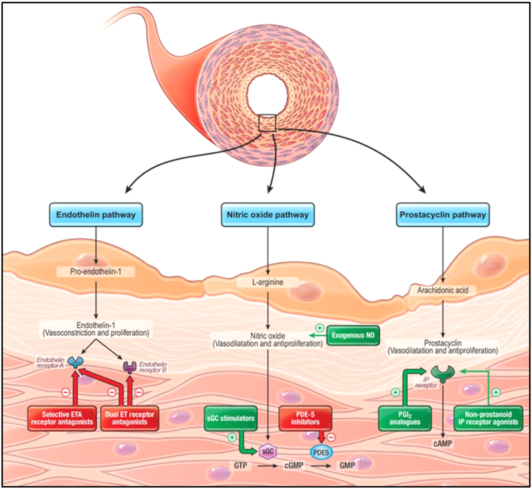Pulmonary Hypertension Unit
Medical Therapy
Targeted PAH medication:
Targeted PAH medication is predominantly prescribed for individuals with pulmonary arterial hypertension (PAH; Group 1). The goals of therapy are to improve symptoms, quality of life and to prevent disease progression, while mitigating potential drug side effects. PAH medications are designed to promote pulmonary vasodilatation, in order to reduce pulmonary pressures and relieve symptoms. These may be prescribed as monotherapy, double combination therapy or as triple therapy. There are currently three main treatment pathways, which includes the nitric oxide pathway, the endothelin pathway and the prostacyclin pathway (click/tap on image below to see full size version).

Humbert et al (2014) ref2
| Examples of targeted PAH Medications used in our centre: | ||
| Endothelin pathway | Nitric oxide pathway | Prostacyclin pathway |
| Macitentan | Sildenafil | Oral selexipag |
| Ambrisentan | Tadalafil | Inhaled iloprost |
| Riociguat | Subcutaneous treprostinil | |
| Intravenous epoprostenol | ||
Additional therapies:
Exercise:
Exercise is really important for cardiovascular health, muscle strength and overall wellbeing. This was reinforced by the European Respiratory Society with a statement highlighting the benefits of exercise training and rehabilitation in pulmonary hypertension. We recommend daily exercise, within your own individual limits.
Vaccination:
We recommend annual influenza vaccination and pneumococcal vaccination every 5 years in line with HSE guidelines.
Supplemental oxygen therapy:
Supplemental oxygen therapy will be considered if your oxygen levels are persistently low, as hypoxaemia (low blood oxygen content) can further worsen pulmonary hypertension by causing the pulmonary blood vessels to tighten, a process that is known as hypoxic-vasoconstriction. Therefore if supplemental oxygen is advised, this should be adhered to like any other medical therapy and used as prescribed. Never smoke or have an open flame near a concentrated oxygen source.
Contraception & pregnancy:
Pregnancy is not recommended for women with a diagnosis of PH, especially group 1 pulmonary arterial hypertension, as it can be dangerous for mum and baby and there is a high risk of death for both. Therefore, in all women of childbearing age with a diagnosis of PAH, we strongly recommend against pregnancy and advise the use of regular, reliable contraception. As oestrogen containing contraceptions are associated with an increased risk of clots (venous thromboembolism), we generally avoid oestrogen based contraception and instead recommend progesterone based contraception (such as the progesterone depo injection), intrauterine devices and male partner sterilisation via vasectomy where appropriate and relevant. The PHA UK website and PAH Europe provide additional information regarding contraception options, but please talk to us in clinic if you have any questions or want to discuss these topics further.
Diuretics
Diuretics, sometimes referred to as ‘water tablets’ are prescribed if you are carrying a little extra fluid. These help your kidneys filter out the extra fluid, in order to take the pressure off your heart. We will likely request regular blood tests to monitor your kidney function if you are prescribed diuretics, to ensure that you do not become dehydrated.
Anticoagulation
Lifelong anticoagulation (or ‘blood thinners’) is recommended for individuals with chronic thromboembolic pulmonary hypertension (CTEPH). We no longer prescribe regular anticoagulation for other types of PH, unless there is an alternative indication.
General advice:
Eat well, sleep well and be kind to yourself – having PH isn’t easy, but you have a whole team and community to support you with your diagnosis.
Air travel:
The oxygen concentration in air decreases with increasing altitude and therefore in-flight oxygen may be required for certain individuals with pulmonary hypertension who wish to travel by airplane. Travelling with oxygen is feasible, but takes some planning and co-ordination with the airline and insurance company, so please consider this in advance. Furthermore, always make sure that you carry your medication in your carry-on luggage, rather than the check in luggage, and that you have adequate medication, particularly to cover for any potential delays that you might encounter during your travels. If you are prescribed specialised PAH medications, there may be additional special considerations. Some helpful tips and checklists are also available in the PHA website.
Other medications:
Calcium channel blockers are typically prescribed to manage hypertension in the general population. In the context of PH, we only use these medications in a specific type of PH that is referred to as ‘calcium channel blocker responsive pulmonary arterial hypertension”. People who benefit from these medications have a ‘positive’ vasoreactivity test during their initial right heart catheterisation. (please link to ‘vasoreactivity’ test, under “investigations”)
If you are prescribed any new medications by a doctor other than your PH physician, always make sure that there is no interaction with your PH medications, either with your local pharmacy or by contacting us in the unit so that we can check for you.
If you have any queries about any of your medications, please contact the Pulmonary Hypertension Unit at 01 8034420.
Click on Links for further information on Pulmonary Hypertension & relevant organisations.
References:
2.Humbert M, Lau EMT, Montani D, et al. Advances in Therapeutic Interventions for Patients With Pulmonary Arterial Hypertension. Circulation 2014; 130: 2189-2208. DOI: doi:10.1161/CIRCULATIONAHA.114.006974.



